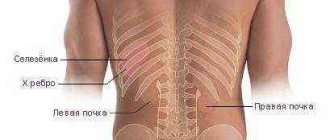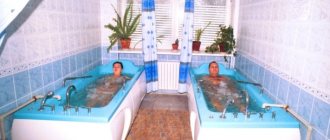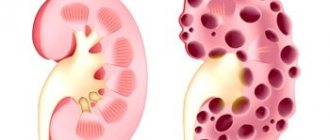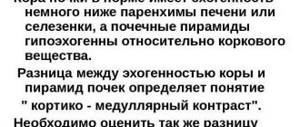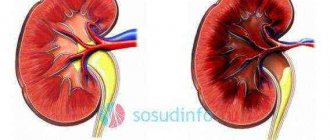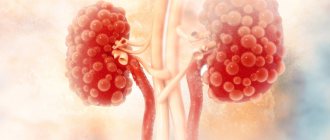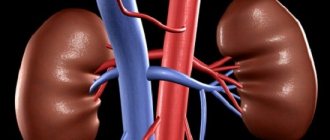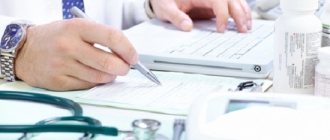What is renal tubulopathy
Renal tubulopathy is a complex of diseases associated with impaired absorption processes in the renal tubules. The pathological process is often congenital, which is associated with developmental anomalies of the urinary system, and is diagnosed already in the first year of life. In this case, we are talking about the primary form of the disease. In adults, tubulopathy occurs less frequently and is more often a consequence of other pathologies and disorders occurring in the body. This is considered the secondary form.
Tubulopathies are associated with damage to the renal tubules
Classification depending on the location of the pathological process:
- Proximal tubule damage:
- cystinuria is a pathology associated with impaired amino acid transport that occurs due to a gene mutation;
- de Toni-Debreu-Fanconi disease - a disease associated with congenital impairment of absorption of phosphates, amino acids and glucose;
- Glucosuria is a disease in which glucose transport is impaired.
- Damage to the distal tubules:
- tubular acidosis is a pathology that is accompanied by a decrease in bicarbonate levels and a high amount of chlorine in the blood;
- Pseudohypoaldosteronism is a violation of sodium absorption that occurs with decreased sensitivity of the tubular epithelium to aldosterone.
- Damage to the collecting ducts provokes hyperaldosteronism associated with increased production of aldosterone.
- Damage to the tubular apparatus - contributes to the occurrence of nephronophthisis associated with damage to the nephron loop and renal tubules.
Among all types of tubulopathy, the most common is glucosuria, which is diagnosed in 6% of newborns.
What is tubular acidosis - video
Features of hereditary types of pathology
Hereditary types of diseases include:
- glucosuria, which is formed in the presence of one mutant structural unit of the gene in the autosome (paired chromosome), resulting in damage to the proximal tubules of the kidneys;
- phosphate diabetes is a disorder of mineral metabolism, which is associated with the predominance of the linked X chromosome;
- cystinuria - occurs with a congenital disorder of metabolic processes, and in most cases, stones are formed in the kidneys;
- de-Tony-Debreu-Fanconi syndrome - is transmitted in an autosomal recessive manner, with a sharp decrease in the amount of calcium and phosphorus in the blood, which affects the musculoskeletal system;
- glycinuria, which is accompanied by a violation of amino acid metabolism, while a large amount of glycine is released with urine;
- nephrogenic diabetes insipidus - the kidney tissue becomes insensitive to antidiuretic hormone, resulting in the release of unconcentrated urine;
- pseudohypoaldosteronism is a genetic mutation associated with impaired reabsorption of salts by the renal tubules;
- nephronophthisis is inherited in an autosomal recessive manner. This is possible if the parents are blood relatives, and a mutation occurs in two similar genes, which affect the nephron loops, damaging them and disrupting the functioning of the renal tubules.
Hereditary tubulopathies occupy first place among all other varieties of this pathology. They are often diagnosed during pregnancy.
Features of diseases with certain syndromes
Syndromes associated with renal tubular damage:
- Rickets-like - similar in course to rickets, often diagnosed in the first year of life and is accompanied by deformation of the lower extremities. This reveals low concentrations of phosphorus and calcium in the blood serum.
- Liddle syndrome is a rare disease and is characterized by constant retention of salts in the body, while large amounts of potassium are excreted.
- Bartter's syndrome is a disorder of water and electrolyte metabolism, accompanied by a decrease in potassium and a change in the acid-base balance in the body.
Tubulopathies associated with various syndromes are difficult to treat.
Features in children
Tubulopathies in children are quite severe, causing retardation in physical and sometimes mental development. The pathological process often involves not only the renal structures, but also the heart, organs of vision and hearing, and blood vessels. Newborns with various types of tubulopathies often have poor appetite and sleep problems. Children grow slowly and their lower limbs are often deformed. In this case, the fontanelle closes quite late, and disturbances in the functioning of the gastrointestinal tract may also be observed.
Reasons for violation
Primary tubulopathy most often occurs for the following reasons:
- disruption of the structure of membranes that transport proteins;
- a small number of enzymes that are responsible for transporting nutrients to the kidneys;
- decreased sensitivity of membranes and tubules to hormones;
- changes in the structure of cell membranes.
Secondary ones arise due to:
- damage to transport tubules, which are inherited;
- acquired diseases, during which metabolic disorders occur;
- presence of dysplasia;
- inflammatory processes in the kidneys.
Causes and provoking factors
The main cause of the pathology is a genetic defect. A number of factors can provoke it. Changes often occur in genes that code for protein synthesis. In most cases, the pathological process begins in the womb. In the fetus, dysplastic processes occur in the renal structures, which subsequently leads to characteristic disorders.
Already in adulthood, the causes of tubulopathy can be:
- heavy metal poisoning;
- long-term use of potent medications;
- blood pathologies;
- severe burns;
- poor nutrition.
Salty and fatty foods can cause disturbances in the functioning of the kidney tubules
The occurrence of structural disorders of the kidneys during intrauterine development can occur due to the use of alcohol, drugs and smoking during pregnancy.
Clinical picture depending on the type of pathology - table
| Type of tubulopathy | Name of the disease | Symptoms |
| Proximal tubule damage | cystinuria |
|
| de Toni-Debreu-Fanconi disease |
| |
| glucosuria |
| |
| glycinuria |
| |
| Distal tubule damage | tubular acidosis |
|
| pseudohypoaldosteronism |
| |
| Collecting duct damage | hyperaldosteronism |
|
| Liddle syndrome |
| |
| Bartter's syndrome |
| |
| rickets-like syndrome (phosphate diabetes) |
| |
| Damage to the tubular apparatus | nephronophthisis |
|
| nephrogenic diabetes insipidus |
|
Diagnostic methods
Effective methods for studying pathology:
- Analysis of urine. The levels of potassium, chlorine, calcium, glucose and sodium are determined in urine. Inflated values indicate malfunctions of the renal tubules and impaired reabsorption (absorption).
- Ultrasound. Ultrasound diagnostics can confirm or refute the presence of changes in the renal structures. In addition, this method allows you to diagnose urolithiasis, which often accompanies various types of tubulopathy.
- Molecular genetic analysis. Helps identify the location of the defect in the chromosome. For the study, blood is taken from a vein.
- Blood analysis. Allows you to detect an increase or decrease in glucose, as well as the concentration of the hormone aldosterone.
Kidney ultrasound can detect pathological changes in the tubules
MRI and CT are used as additional research methods. Tomography allows you to obtain high-quality and detailed images of the kidneys. In this case, the doctor can easily diagnose the slightest structural changes.
Treatment with folk remedies
Chamomile is a natural antiseptic.
If your kidneys are sick, you can try to get rid of the problem with folk remedies. Traditional medicine helps in cases where minor inflammation has occurred or the disease is at an early stage. Below are the names of herbs that are effective in treating kidney diseases:
Decoctions, infusions and other medicinal products are prepared from the above components. The medicinal herb can have a diuretic effect and remove toxins from the body. Decoctions from natural ingredients eliminate unpleasant symptoms and have an antispasmodic effect. Sometimes folk remedies are used in the postoperative period or as a preventive measure for kidney diseases.
Therapeutic tactics
Congenital forms of tubulopathy are difficult to treat, so in this case the symptoms are corrected. For the treatment of all types of disease, a diet is prescribed that is aimed at changing the acid-base balance. Bone deformities are corrected through surgical correction.
Hemodialysis, which is a method of blood purification, produces a good effect. This method of treatment is used for chronic renal failure, which often results from congenital tubulopathy. Hemodialysis is carried out using an artificial kidney machine. In this case, the blood is driven through the device, purified and returned to its normal course.
In a hospital setting, intravenous infusions of sodium chloride are also often used, which help prevent dehydration.
Hemodialysis cleanses the blood of toxins
Treatment of tubulopathy is long-term and requires an integrated approach. Folk remedies are not used for this type of disease and can even cause harm. Therefore, it is important not to self-medicate, but to follow all doctor’s recommendations.
Diet food
When treating various types of tubulopathy, an alkalizing diet is used. Exclude from the diet:
- citrus;
- sorrel;
- tomatoes;
- meat;
- chocolate;
- mushrooms;
- alcohol;
- juices;
- soda.
The menu should include the following products:
- potato;
- cabbage;
- dairy products;
- bananas;
- persimmon;
- zucchini;
- eggs;
- fish;
- jelly;
- cucumbers;
- pasta.
The drinking regime is discussed with the doctor and in each case certain norms are adhered to. In case of renal failure, the amount of water is reduced to 500–700 ml. With normal functioning of organs, you can drink up to 1.5 liters of liquid.
Meals should be fractional, it is not recommended to overeat. You should eat food 4 times a day.
What to include in the menu - photo gallery
Potatoes are healthy boiled and stewed
Cabbage promotes gentle alkalization of the body
Dairy products help strengthen bones
Bananas are rich in starch
Persimmon improves digestion
Zucchini can be eaten as a stew
Eggs contain a lot of healthy protein
Fish can be eaten boiled or baked
Kissel can be consumed with a minimum amount of sugar
Cucumbers contain a lot of liquid and prevent dehydration.
Pasta can be eaten with non-spicy sauces
Drug therapy
Groups of medications that are used to correct symptoms for various types of tubulopathy:
- Painkillers: No-shpa, Spazmalgon. Prescribed to relieve attacks of renal colic. This group of medications is used only during exacerbation of pain symptoms.
- Anti-inflammatory: Canephron, Phytolysin, etc. Used for pyelonephritis, which often occurs in various types of tubulopathy. These drugs improve the condition of the kidneys by eliminating inflammation.
- Antibacterial: Furagin, Zinnat, etc. Prescribed to eliminate the inflammatory process in progressive forms of tubulopathy. These medications destroy bacterial flora.
- Preparations containing potassium. Most often prescribed: Potassium chloride, Potassium and magnesium from Doppelhertz, etc. These medications prevent cardiac disorders and relieve seizures. Taking potassium supplements for tubulopathy is necessary for a long time, since a lot of this substance is excreted in the urine.
Drug treatment is used only as maintenance therapy. It is not possible to completely eliminate tubulopathy.
What medications are used for treatment - photo gallery
No-spa eliminates renal colic
Furagin eliminates pathogenic microflora
Potassium and magnesium in tablet form prevent the occurrence of seizures and cardiovascular diseases
Canephron has an anti-inflammatory effect
Prevention
Prevention of kidney and urinary tract diseases significantly reduces the risk of pathologies. A person should eat right and lead an active lifestyle. Doctors recommend stimulating points that improve the functioning of the kidneys and ureter. You need to drink enough liquid every day. If the first unpleasant signs occur, you should consult a doctor.
Source: https://etopochki.ru/bolezni-pochek/inie/vidy-boleznej.html
« Reply #127: 16 January 2020, 20:15:10 »
our experience visiting the clinic
We found the clinic on the Internet and made an appointment for an EEG. We have a speech delay; our 3.5-year-old child barely speaks. he says something unclear, not clearly and rather little, his hearing is normal, he does a lot of things but silently, or shows with gestures, when asked to speak his desires and requests, he begins to get nervous and shy away..
In general, we arrived at the clinic, they did the EEG quite quickly - within 5 minutes maximum the baby was in the sensors, we had to hold him, he got a little scared and resisted, but nevertheless the EEG seemed to be done, after which we naturally made an appointment with a neurologist to discuss test results. We were assigned to see neurologist Gorokhova. Based on the results of the EEG, Gorokhova did not find anything particularly serious, but noted a delay in the development of brain structures. and referred for additional consultation to Korableva. simultaneously prescribing the first part of the drugs, namely: 1. aminovil-R 250 mg, prolan 200, oldarin 100, aminovit Z 120, cerebron 150, neurovit R, 100 mg. 2 times a day for 11 days.
After the deadline, we went to the ship's office, because... This visit fell on the New Year holidays, so I went with my husband, he sat with his things at the door and we, accordingly, had a consultation.
Having seen the child within 3 minutes, she began to press, in a harsh ultimatum voice she began to talk about anomalies, deformities, etc. not a single doctor before her had given anything like this, despite the fact that when asked what exactly anomylia was and what the deformity was, she could not answer directly, after which the word disability was uttered..
Unlike impressionable parents, I thought that this was probably not so bad - if she could give a medical opinion, including indications of disability (although no one objectively, either of the doctors or of the people who communicated with him, thought so), the point is The fact that it’s easier to get kindergartens with a disability, we’ve been standing in line for a kindergarten for 3 years now and still can’t get it, and next year they warned it would be the same - I started asking her to give an opinion on disability, which she refused to do. in general, a stream of intimidation, terms that, when asked to decipher, you begin to understand that they mean nothing, and a clear feeling of bending for money in such a rude and peremptory voice, something like NLP persuasion methods, etc. psychiatrists and others are familiar with this. In general, she prescribed us a new course. for 18 days, while the phrase slipped through - “it is likely that there will be no changes from amino acids,” and you need to take nootropics. True, she quickly stopped developing this idea further
aminovil-R, dosage 250 mg. aminosmunol 220, glucaprim - P, 250 mg. prolan, 200 mg. Cerebron 150 mg. Sevit forte 1.5 ml. each drug 4 times a day 2 hours after meals, in general, pills at once
my husband was sitting in the corridor and while he was waiting for us, he heard a security guard (apparently new) talking with one of the doctors and asking something about treatment and amino acid pills, part of the conversation became sharply quieter, but the last phrase of the doctor who asked the security guard to “communicate more quietly” was clearly audible otherwise there are clients walking around here"
all this together (the ship with persistent psychoterms and pressure to squeeze out money and scare parents to the point of “gasping for air” + the last part of the security guard’s conversation) made us think about the need for this clinic, but then these were just assumptions.
By the way, the conversation with the cashier only strengthened my suspicions. as I say, the pills are not cheap and I had to go back to buy a new part of these dietary supplements (as they are written, they are not medicines and are not supplied with any instructions with GOSTs, etc., the dosage is written on a piece of paper without the signature of the doctor who prescribed this dosage)
While buying the jars, I acted like a fool and said, “maybe I shouldn’t buy Sevit - it says olive oil.” “It’s somehow expensive to pay 400 rubles for 10 ml... there was another component besides olive, but I’m just saying it for the sake of conversation. what does the cashier care about? with aggression and in a raised tone - “you are prescribed to drink, so drink as indicated on the piece of paper! "I say well. We're drinking... I'm just asking if it's possible to replace it. to which the (magical) answer is “well, you come here yourself. no one drove you here..”
to which my answer was already “well, you called yourself a clinic and so you came,” although I understand what it means when they say that - “I warned you, and then decide for yourself”
but the most magical thing happened later - while we were taking the pills, we went to the children's center, brought conclusions about the developmental growth disorder from different clinics and asked to join them for classes or a stay group. We talked with a speech pathologist and speech pathologist, she asked us what kind of medications you are taking, I tell you everything about Primavera and amino loading in good faith, she asked “do you have a doctor’s report in paper form and a written recommendation on medications” - I naturally say that for such a number of visits not a single piece of paper appeared in our hands, the speech therapist was surprised and asked if we were paying for our visits and asked us to take, if possible, what they would give,
With this question I’m calling the ship’s office and asking for an opinion on the diagnosis and a list of recommendations for the prescribed medications.
The ship’s answer was more than blatant: “Why and who needs this? By law, a psychiatrist should not give anything out to anyone.”
I. But it was you who prescribed the drugs, Ship. “maybe, but our treatment is our secret and no one needs to know anything except you,” especially speech therapists, they have no right to ask you for anything. Am I explaining clearly?"
“I will issue a report to the ZRR rehabilitation center, but I will absolutely not prescribe medications..”
in response to my repeated request to still sign on a piece of paper with the dosages and put at least the clinic’s stamp that it was the primavera who prescribed these substances, that the speech pathologist-defectologist is asking us about this to register for classes, it went absolutely gorgeous - “you yourself have obsessive-compulsive disorder, you it is necessary to undergo treatment and not for the child, I look forward to seeing you in person next time for consultation and treatment.”
this is a curtain. I have no more questions or requests for these polite, caring “doctors”. I think there is no need to further explain why. I decided to stop the course of treatment. Go to the laboratory in between to determine the composition of the pills. From everything it turned out that for 20 thousand they received another certificate of developmental development and no activities with the child except stuffing, etc. many “pleasant” memories from communicating with the doctor. The baby began to wake up at night, which he had not done before, began to squeak in an ultrasonic voice, we did not see any obvious changes during the first course. didn’t speak in syllables, much less in words... there seemed to be new sounds at first, then silence again...
In general, as a consultant, Gorokhova is more or less adequate, Shipleva - no comment on whether it’s all worth the money and effort (they forcibly drank pills for 30 days), and this was just the beginning. I don’t even drink the entire first course (60 days)
In short, exercise therapy classes, speech pathologist, speech pathologist, maybe nootropics, in the end, I decided to take a break from primavera. feelings of vampiric and indifferent attitude
« Last edited: 16 January 2020, 20:38:53 by nsm »
Source: https://forum.detiangeli.ru/index.php?topic=61218.120
Related articles:
- Sorrel kidney stones Causes of formation of kidney stones Nephrolithiasis, as one of the manifestations of urolithiasis, is a widespread pathology. It affects people rich and poor, in cities and villages, living in countries with a high standard of living and in undeveloped economies. Despite its wide representation in the world, [...]
- Forum hydronephrosis in children Hydronephrosis in children: 3 degrees and their treatment Hydronephrosis in children is an expansion of the cavity structures of the kidney, resulting from a prolonged increase in the hydrostatic pressure of urine in them. The disease develops when an obstruction to normal flow forms in the area where the ureter exits the kidney […]
- How is kidney inflammation characterized? Kidney inflammation: symptoms and treatment | How to treat kidney inflammation The most common types of this inflammation are pathologies such as: urolithiasis, glomerulonephritis, pyelonephritis. Each type of kidney inflammation has its own specifics. Symptoms of the development of kidney inflammation The main […]
- Ultrasound of renal vessels Ekaterinburg Ultrasound of renal vessels Ultrasound Dopplerography of renal vessels (ultrasound of renal vessels) is based on the Doppler effect. identify disturbances in the blood supply to the kidneys; identify early vascular disorders, including those caused by blood clots and atherosclerotic plaques (for example, renal thrombosis […]
- Risk factors for urolithiasis Symptoms and treatment of urolithiasis Leave a comment 2,724 General information The diagnosis of urolithiasis in adults is made in 35-40% of all urological visits. Men are 3 times more likely to develop stones than women. Kidney and urinary stones occur in the working population. […]
- The right kidney is enlarged during pregnancy Causes of enlargement of the renal pelvis in the fetus and methods of treatment Contents: [ hide ] Causes of the disease Diagnosis of the disease Features of treatment All pregnant women undergo special examinations before giving birth, which help not only to find out about the health of the expectant mother, but also the fetus. Many complications can be […]
- Doubling and 3 kidneys Doubling a kidney: how dangerous is the development of pathology and how to overcome the disease Today, cases of doubling kidneys have become quite common. This anomaly sometimes leads to serious diseases of the urinary system, and sometimes the patient may not even be aware of his pathology. A little about […]
- Herbs for kidneys forum Herbs for treating kidneys in folk medicine Contents: Medicinal herbs Birch buds Silver birch (warty birch) is a valuable medicinal plant, its buds have a number of useful properties: Anti-inflammatory and antibacterial - resist infections and pathogenic microorganisms. They have sweatshops, […]
Forecast and consequences
With congenital forms of tubulopathy, the prognosis is unfavorable. Dehydration can be fatal. However, with a timely approach to treatment in a hospital setting, it is possible to maintain the functional activity of the kidneys, which will improve the patient’s quality of life. With acquired pathology, the prognosis is more favorable. If you stick to a diet and take medications, you can avoid dangerous consequences and enjoy a full life.
With various types of tubulopathy, the following complications are possible:
- blockage of the urethra by a stone;
- acute attack of renal colic;
- kidney failure.
With advanced tubulopathy, blockage of the ureter with a stone may occur
The primary form of tubulopathy is considered one of the most difficult to treat diseases encountered in urological practice.
